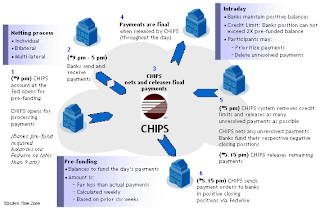The Clearing House Interbank Payments System (CHIPS) is the main privately held clearing house for large-value transactions in the United States, settling well over US$1 trillion a day in around 250,000 interbank payments. Together with the Fedwire Funds Service (which is operated by the Federal Reserve Banks), CHIPS forms the primary U.S. network for large-value domestic and international USD payments (where it has a market share of around 96%). CHIPS transfers are governed by Article 4A of Uniform Commercial Code.
CHIPS is owned by financial institutions. According to the Federal Financial Institutions Examination Council (FFIEC), an interagency office of the United States government, "any banking organization with a regulated U.S. presence may become an owner and participate in the network. CHIPS participants may be commercial banks, Edge Act corporations or investment companies. Until 1998, to be a CHIPS participant, a financial institution was required to maintain a branch or an agency in New York City. A non-participant wishing to make international payments using CHIPS was required to employ one of the CHIPS participants to act as its correspondent or agent.
Banks typically prefer to make payments of higher value and of a less time-sensitive nature by CHIPS instead of Fedwire, as CHIPS is less expensive (both by charges and by funds required).
CHIPS differs from the Fedwire payment system in three key ways. First, it is privately owned, whereas the Fed is part of a regulatory body. Second, it has 47 member participants (with some merged banks constituting separate participants), compared with 9,289 banking institutions (as of March 19, 2009)[2] eligible to make and receive funds via Fedwire. Third, it is a netting engine (and hence, not real-time).
A netting engine consolidates all of the pending payments into fewer single transactions. For example, if Bank of America is to pay American Express US$1.2 million, and American Express is to pay Bank of America $800,000, the CHIPS system aggregates this to a single payment of $400,000 from Bank of America to American Express — only 20% of the $2 million to be transferred actually changes hands. The Fedwire system would require two separate payments for the full amounts ($1.2 million to American Express and $800,000 to Bank of America).
Only the largest banks dealing in U.S. dollars participate in CHIPS; about 70% of these are non-U.S. banks. Smaller banks have not found it cost effective to participate in CHIPS, but many have accounts at CHIPS-participating banks to send and receive payments.
Clearing houses are institutions devoted to the exchange of information and the fulfillment of payment processing. A financial clearing house assures that two parties to a transaction do not default. Financial clearing houses include institutions devoted to the clearing of transactions involving the trading of financial securities and the conduct of specific forms of electronic payments.
A wire transfer system for large-value wholesale real-time interbank settlements, the Clearing House Interbank Payments System (CHIPS) is the largest private-sector global clearing house for cross-border dollar transactions, accounting for 95 percent of all international payments conducted in dollars. Wholesale payments are large interbank payments for purposes such as commercial transactions, bank loans, and securities transactions.
CHIPS engage predominantly in large trade-related transactions and foreign exchange transactions denominated in dollars. CHIPS also accounts for 5 percent of U.S. domestic large-value business-to-business payments. CHIPS is owned by 46 member banks from 22 countries and is operated by the Clearing House, an association that is owned by 22 major U.S. member banks. CHIPS can be used by any banking organization with a regulated U.S. presence.
CHIPS was created in 1970 by the New York Clearing House, and according to former Federal Reserve chairman Alan Greenspan, it represented “the most significant qualitative change in clearing house arrangements.”
Transfers between banks occur in two parts: clearing and settlement.
Clearing is when payment information is sent and received between participants.
Settlement is when actual payment occurs.
Banks have two main options when processing interbank payments in dollars: Fedwire, operated by the Federal Reserve Bank, and CHIPS. CHIPS has some distinct advantages over Fedwire. One advantage is that CHIPs uses a patented multilateral netting settlements process. CHIPS keeps track of payments coming in and out of a particular bank’s account and releases a single payment whenever the bank is in a positive position so that it will never be in an overdraft position. This is different from Fedwire, which processes transactions individually using a real-time gross settlement process that may leave banks occasionally in overdraft positions that must be settled by the end of the day. The Fed charges fees on those overdraft positions. Thus CHIPS reduces overdraft fees.
CHIPS reduces the number of transactions between international and domestic banks during the day and processes more than $2 trillion per day.
While CHIPS and Fedwire are competitors, CHIPS could not operate without Fedwire. CHIPS uses Fedwire to conduct its transactions. Banks participating in CHIPS use a joint CHIPS account at the Federal Reserve to set aside funds for CHIPS transactions.
They pre-fund the account to meet settlements throughout the day. Late in the day, there is a second chance to fund any settlements that could not be met with the initial balance. Those settlements are not released unless the bank is in a positive position.
If the bank chooses not to be in a positive position, those payments are deleted and the bank can settle them using Fedwire directly. This is one disadvantage to using CHIPS over Fedwire. Payments made via Fedwire are final and irrevocable. Some payments made over CHIPS may not be final until the settlements are made final at the end of the day.


Awesome information
ReplyDelete